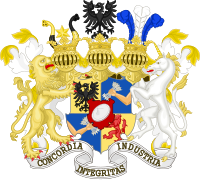
Photo from wikipedia
Drawing on upper echelons theory, this study examines how the traditionality of family chief executive officers (CEOs) influences the selection of their successors, and how this relationship is moderated by… Click to show full abstract
Drawing on upper echelons theory, this study examines how the traditionality of family chief executive officers (CEOs) influences the selection of their successors, and how this relationship is moderated by two dimensions of socioemotional wealth. Recognizing the central role of CEOs in determining successors, we show that a family CEO’s cultural values regarding traditionality have a significant positive effect on the probability that a family member is chosen as successor. We find that this relationship is strengthened by the family members’ identification with the firm and weakened by the family members’ sense of dynasty. Our contributions to theory and practice are discussed.
Journal Title: Family Business Review
Year Published: 2020
Link to full text (if available)
Share on Social Media: Sign Up to like & get
recommendations!